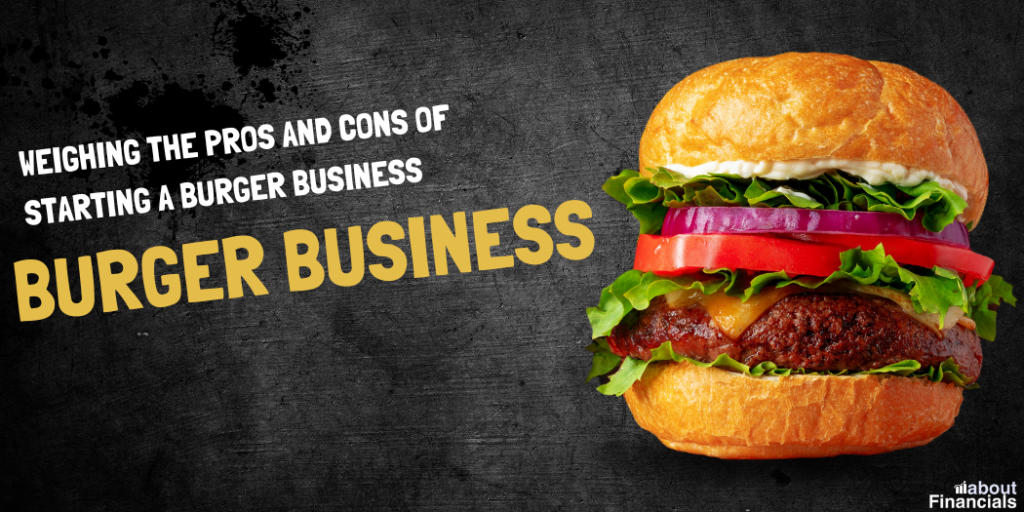The burger industry has flourished over the years, evolving into a culinary phenomenon that transcends borders and cultures.
From humble street food to gourmet creations, burgers have become an integral part of our gastronomic landscape.
Understanding the pros and cons of starting a burger business before embarking on this journey can mean the difference between sizzling success and going up in smoke.
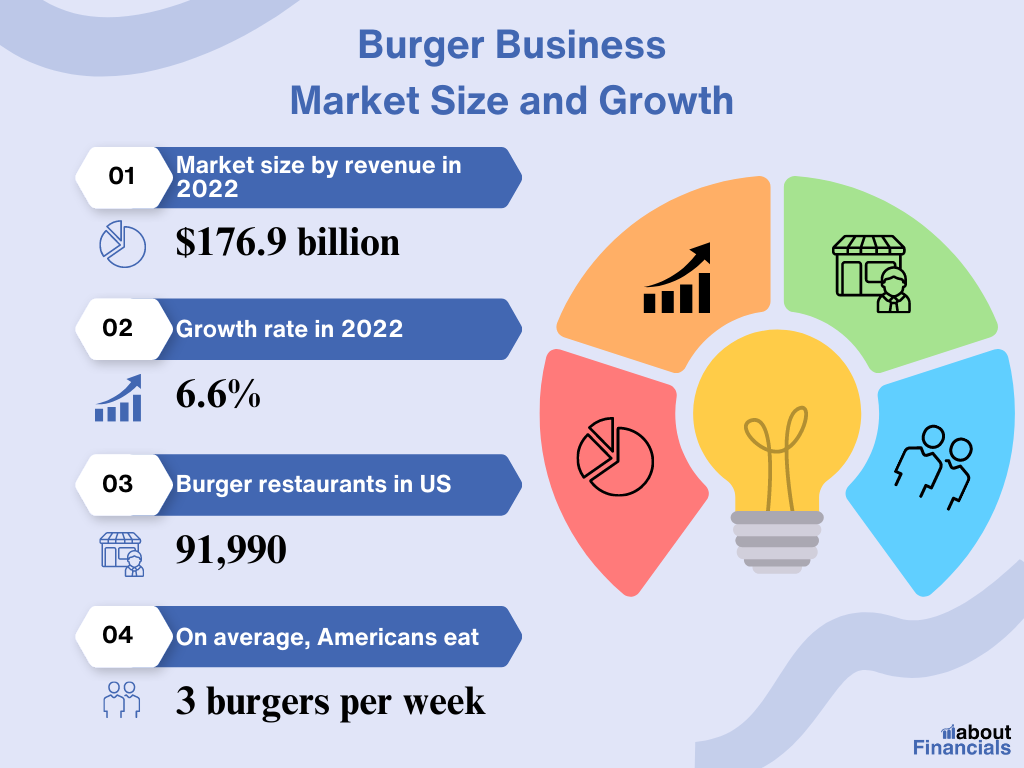
By exploring the practical advantages and disadvantages, aspiring burger entrepreneurs can pave their way to burger glory while mitigating potential pitfalls. So, let’s dive into the world of burgers and dissect the ingredients for triumph!
Pros of starting a burger business
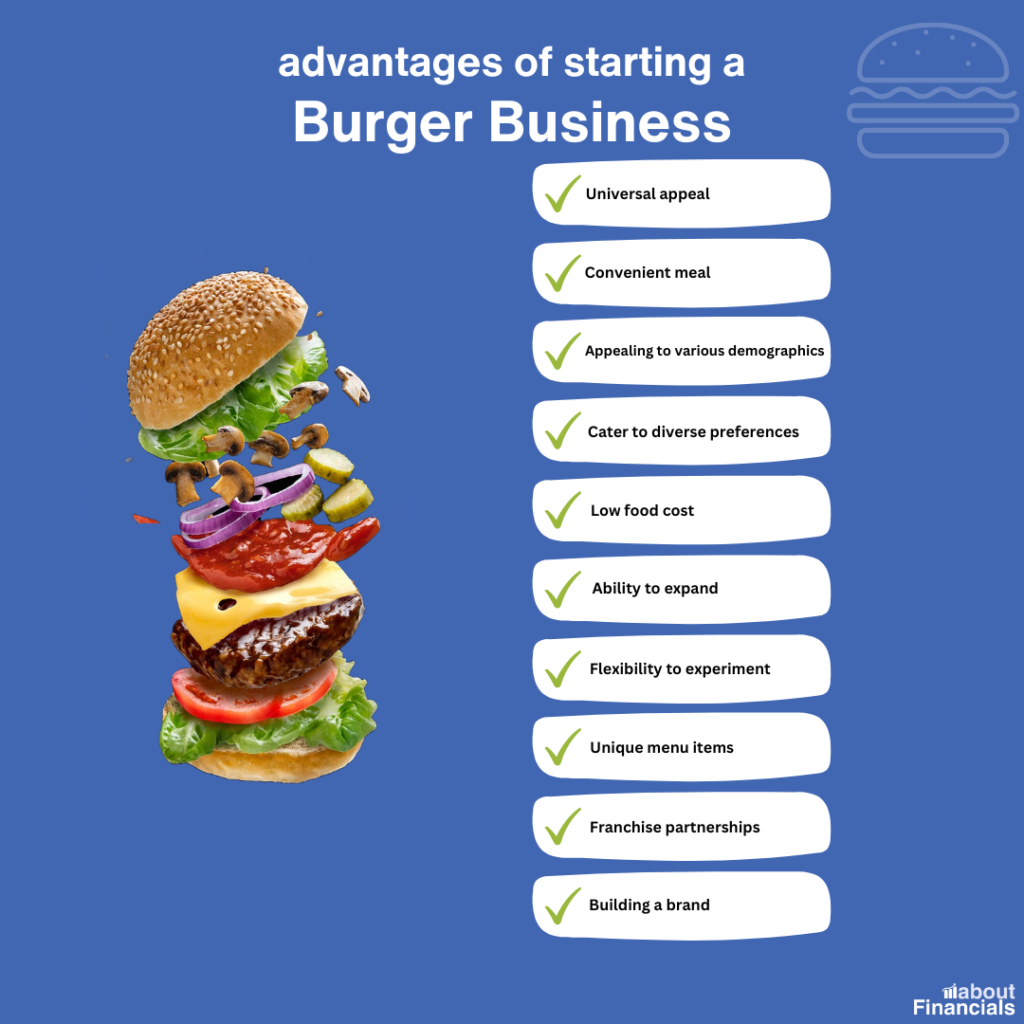
1. Popularity and universal appeal
From bustling cities to cozy towns, the love for burgers knows no bounds.
Whether it’s the classic cheeseburger or the adventurous gourmet creation, burgers have a unique ability to captivate a wide range of palates.
Their universal appeal transcends age, gender, and cultural boundaries, making them a sought-after choice for food enthusiasts around the globe.
2. Increasing consumer preference for convenient meals
In a fast-paced world where time is of the essence, the demand for quick and convenient meals has skyrocketed.
Burgers perfectly fit the bill, offering a delicious solution to those seeking a satisfying meal on the go. With their portable packaging, burgers provide a convenient option for busy individuals who crave a delicious bite without sacrificing precious minutes.
This growing consumer preference for quick, convenient meals presents a prime opportunity for aspiring burger entrepreneurs to tap into a thriving market and carve their own flavorful success story.
3. Versatility in appealing to various demographics
One of the remarkable aspects of burgers is their ability to entice a diverse range of individuals.
Their versatility allows them to seamlessly fit into different lifestyles, making them a go-to choice for people from all walks of life.
By embracing this wide target market, burger entrepreneurs can cast their net wide and attract a loyal customer base.
4. Customization to cater to diverse preferences
The beauty of burgers lies in their endless customization possibilities.
From selecting the type of patty and cheese to adding an array of toppings and sauces, customers can tailor their burgers to suit their personal preferences.
This customization aspect opens up a world of opportunities for burger businesses to cater to diverse tastes and dietary requirements.
Whether it’s offering vegetarian or vegan options, catering to gluten-free diets, or embracing unique flavor combinations, the ability to adapt to various preferences allows burger entrepreneurs to create a menu that resonates with a broad spectrum of customers.
5. Relatively low food cost
One of the advantages of a burger business is its comparatively low food cost.
With a streamlined menu and a focus on key ingredients, the expenses associated with sourcing and preparing the necessary components can be controlled effectively.
This cost efficiency allows burger entrepreneurs to maximize their profit margins while still delivering delectable, high-quality burgers that keep customers coming back for more.
6. Ability to expand the business
With the right strategies in place, a successful burger business can be scaled up to reach new heights.
The demand for burgers, coupled with their universal appeal, creates ample opportunities for expansion.
Whether it’s opening additional locations, exploring franchising options, or even venturing into food truck operations, the scalability of a burger business is a compelling advantage.
By carefully strategizing and executing expansion plans, entrepreneurs can build a brand that transcends boundaries and secures a profitable future.
7. Flexibility to experiment with recipes and flavors
One of the exciting aspects of running a burger business is the freedom to explore a vast spectrum of flavors and ingredients.
From traditional favorites to bold, unconventional combinations, the burger canvas is your playground.
This creative flexibility allows you to experiment with diverse patty options, cheese varieties, sauces, and toppings, crafting unique flavor profiles that ignite the taste buds of your customers.
By continuously innovating and refining your burger recipes, you can keep your menu fresh, enticing, and a step ahead of the competition.
8. Opportunities to introduce unique menu items
In the ever-evolving culinary landscape, trends come and go.
As a burger entrepreneur, you have the opportunity to embrace these trends and captivate the hearts of trend-seeking food enthusiasts.
Whether it’s incorporating plant-based burger alternatives, offering gourmet burger specials inspired by international cuisines, or catering to dietary restrictions with gluten-free or keto-friendly options, your menu can become a canvas for innovation.
By staying attuned to consumer preferences and market trends, you can introduce exciting, buzz-worthy menu items that draw attention, generate excitement, and keep customers curious and coming back for more.
9. Possibility to expand through franchise partnerships
With a winning formula in hand, there exists a golden opportunity to expand your brand through strategic franchise partnerships.
Franchising allows you to replicate your business model, share your proven recipes, and capitalize on the entrepreneurial drive of passionate individuals who want to be a part of your burger empire.
By carefully selecting and nurturing franchisees, you can extend your reach to new territories, tap into local markets, and achieve accelerated growth that wouldn’t be possible through standalone operations alone.
10. Building a recognizable brand
In the competitive world of burgers, establishing a recognizable brand identity is very critical.
From a captivating logo and enticing visual aesthetics to a cohesive brand voice and exceptional customer experience, every touch point with your target audience contributes to building a brand that resonates.
By consistently delivering exceptional quality, service, and flavors, you can create a loyal following of burger enthusiasts who become ambassadors for your brand.
This loyal customer base not only drives repeat business but also spreads positive word-of-mouth, attracting new customers and further solidifying your brand’s presence in the market.
Disadvantages of starting a burger business
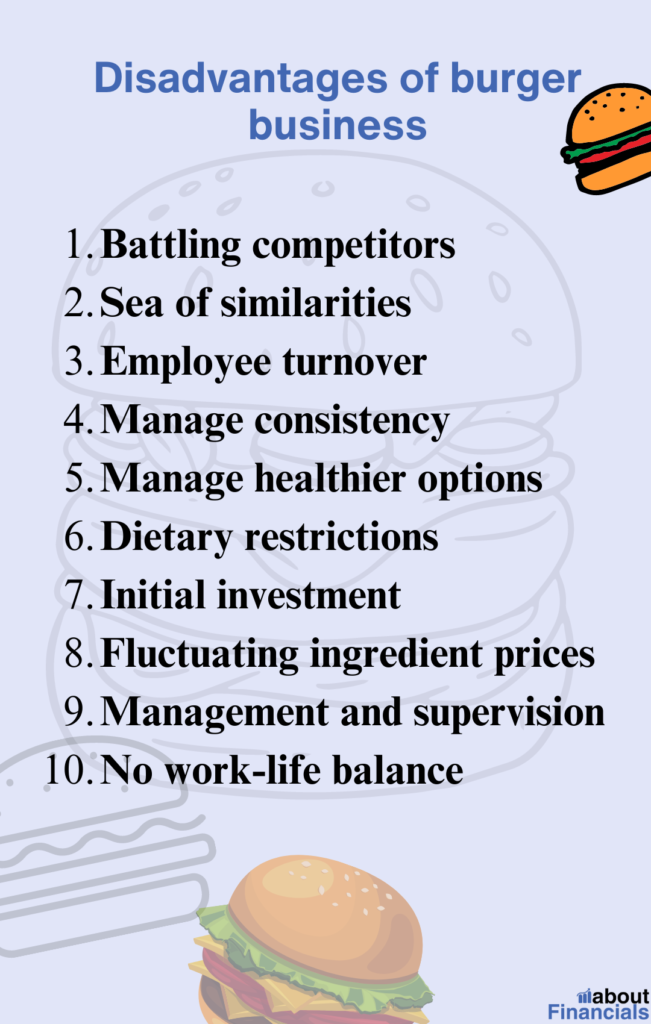
1. Battling competitors
The burger industry is teeming with well-established burger chains and local competitors. Each vying for a slice of the market.
Competing against their extensive resources, established supply chains, and established customer loyalty can be a significant challenge.
2. Standing out in a sea of similarities
The burger market is saturated, with numerous establishments offering similar menu items.
This makes it challenging to differentiate your burger business and create a unique selling proposition.
Finding your distinct voice, offering a memorable dining experience, and showcasing what sets you apart from the competition is crucial. Without a clear differentiator, it becomes challenging to capture the attention and loyalty of customers in a crowded marketplace.
3. High employee turnover
The food industry, including the burger business, is known for its high employee turnover rates.
Finding and retaining skilled and committed staff can be a constant challenge.
Training new employees, ensuring they understand your operational processes, and fostering a positive work environment requires ongoing effort.
Overcoming this hurdle and building a reliable, dedicated team is crucial to maintaining smooth operations and delivering exceptional customer experiences.
4. Consistency
Customers expect their favorite burgers to taste the same every time they visit your shop.
However, maintaining consistent food quality and service standards can be an ongoing struggle.
It involves careful monitoring of ingredient quality, precise cooking techniques, and meticulous adherence to standardized recipes.
Balancing the need for efficiency and speed with delivering consistently delicious burgers can be demanding but is essential for building customer trust and loyalty.
5. Embracing the rise of healthier options
As more individuals prioritize their well-being, there is a growing expectation for healthier burger options that align with their dietary goals.
Whether it’s offering leaner protein alternatives, incorporating more plant-based ingredients, or providing gluten-free or low-carb options, catering to health-conscious customers can be a powerful way to attract a broader customer base and stay ahead of evolving food trends.
6. Dietary restrictions and preferences
In today’s diverse culinary landscape, addressing dietary restrictions and accommodating various preferences is a must for any burger business.
Customers may have specific dietary needs, such as vegetarian, vegan, or allergen-free requirements.
By offering thoughtful menu options that cater to these needs, you not only broaden your potential customer base but also demonstrate inclusivity and a commitment to customer satisfaction.
Flexibility and transparency in ingredient sourcing and preparation methods are essential to meet the diverse preferences of your customers.
7. Initial investment and ongoing expenses
Starting a burger business requires careful financial planning and investment.
There are various factors to consider, such as securing a suitable location, acquiring necessary equipment, and outfitting the establishment.
These initial expenses can significantly impact your startup costs. Additionally, ongoing expenses, including rent, utilities, wages, and marketing, must be carefully managed to ensure long-term sustainability.
8. Fluctuating ingredient prices
The prices of key ingredients, such as meat, cheese, and produce, can vary due to factors like seasonality, market trends, and global economic conditions.
These fluctuations can impact your bottom line and profitability.
Moreover, operational costs, including utilities, maintenance, and equipment upgrades, also need to be factored into your financial considerations.
9. Management and supervision
Running a successful burger business requires a significant time commitment, especially in the early stages.
From overseeing day-to-day operations to managing inventory, coordinating staff, and ensuring quality control, hands-on management and supervision are essential.
This level of involvement allows you to maintain consistency, address issues promptly, and provide the best possible customer experience.
10. Work-life balance challenges
The demanding nature of the burger business often means long working hours and limited personal time.
As an entrepreneur, it’s not uncommon to find yourself immersed in the operations, striving to deliver the best burgers and customer service.
Achieving work-life balance can be challenging, requiring conscious effort to carve out personal time and prioritize self-care.
16 actionable steps to start a burger business
1. Identifying target market and competition
This involves identifying your target market—the specific demographics, preferences, and needs of your potential customers. Understanding your competition, including both established burger chains and local players, allows you to assess the market landscape, identify gaps or opportunities, and craft a unique value proposition that sets you apart.
2. Savoring the flavor
To succeed in the burger business, it’s vital to analyze consumer preferences and stay abreast of current trends.

Conducting surveys, interviews, and analyzing market data can provide insights into the flavors, ingredients, and dining experiences that resonate with your target market.
By understanding and adapting to evolving consumer trends, you can tailor your menu, ambiance, and marketing strategies to capture the hearts and taste buds of your customers.
3. Developing a business plan
A well-defined concept, vision, and mission lay the groundwork for a successful burger business.
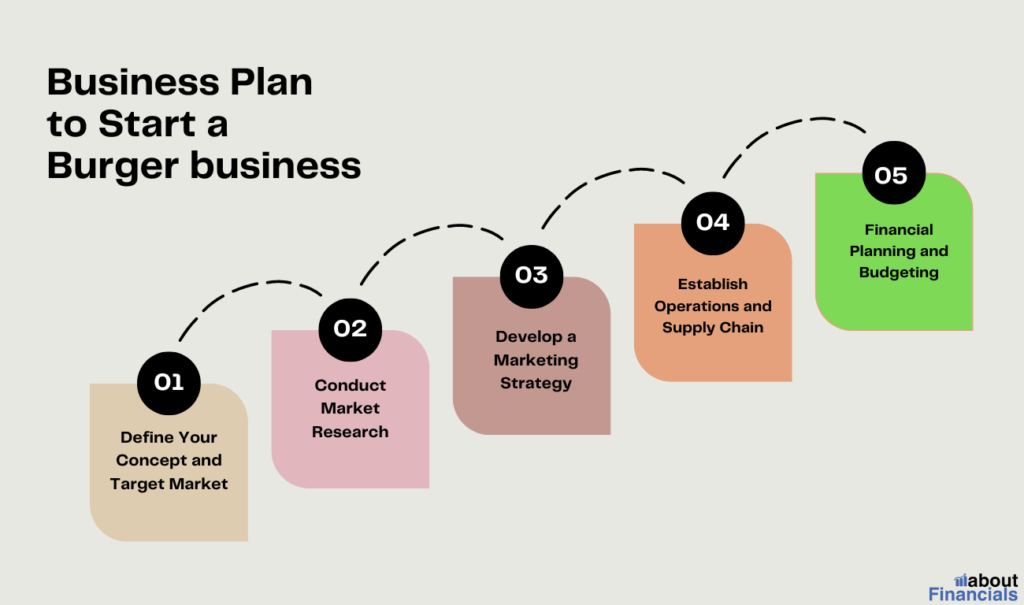
Clearly articulate what makes your burgers unique, your aspirations for the business, and the core values that will guide your operations.
This serves as a compass, aligning your actions and decisions with your long-term goals and brand identity.
4. Setting goals and financial projections
A comprehensive business plan includes setting realistic goals and financial projections.
Define measurable objectives, such as sales targets, customer acquisition goals, and milestones for expansion.
Develop a financial forecast that covers startup costs, operational expenses, pricing strategy, and revenue projections. This roadmap not only provides a roadmap for your business but also serves as a tool to attract investors or secure financing if needed.
5. Exploring financing options
Turning your burger business dream into reality requires securing the necessary funding and resources.
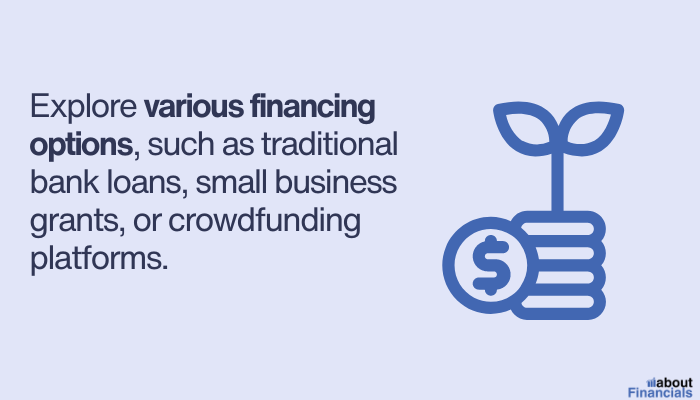
Explore various financing options, such as traditional bank loans, small business grants, or crowdfunding platforms.
Additionally, consider seeking investment from angel investors or venture capitalists who believe in your vision.
Present a compelling business plan and demonstrate the potential for profitability to attract financial support and fuel the growth of your burger business.
6. Estimating the initial capital
Consider costs such as equipment, inventory, marketing, lease agreements, employee wages, and permits/licenses.
Factor in contingencies and ensure your budget aligns with your financial projections.
By conducting a thorough assessment and careful budgeting, you can plan for the financial needs of your burger business and navigate the early stages with confidence.
7. Assessing ideal location and demographics
Assess potential locations based on factors such as foot traffic, proximity to your target market, visibility, and competition.

Consider the demographics of the area, ensuring it aligns with your target customers’ preferences and spending power.
A prime location can significantly impact your customer reach and brand visibility, setting the stage for success.
8. Acquiring necessary permits
Research the local regulations, health department requirements, and zoning restrictions specific to your area.
Obtain permits for food handling, alcohol service (if applicable), signage, and any other relevant licenses.
Complying with legal obligations ensures a smooth and uninterrupted operation, allowing you to focus on serving mouthwatering burgers to your eager customers.
9. Designing a diverse and appealing menu
Craft a menu that balances classic favorites with innovative creations, catering to a range of palates. Consider offering diverse patty options, signature sauces, unique toppings, and vegetarian or vegan alternatives to cater to a wider customer base.
By carefully curating your menu, you can offer an enticing selection that keeps customers coming back for more.
10. Establishing relationships with reliable supplier
Form strong alliances with reliable suppliers who provide fresh, high-quality produce, meat, cheese, and other essential components.

Seek suppliers who share your commitment to sustainability, ethical sourcing, and consistent product quality.
Cultivating these relationships ensures a steady supply of top-notch ingredients, enabling you to create burgers that truly stand out.
11. Defining job roles and responsibilities
A well-organized team is essential for smooth burger business operations.
Clearly define job roles and responsibilities, from kitchen staff and servers to managerial positions.
Outline the skills and qualifications required for each role and create a supportive and collaborative work environment where everyone understands their contributions to the overall success of the business.
12. Training programs for employees
Develop comprehensive training programs that encompass burger preparation techniques and food safety protocols. It should also include customer service excellence and the overall brand experience.

Empower your employees with the skills and knowledge needed to deliver mouthwatering burgers and create memorable dining experiences.
By investing in training and fostering a culture of continuous improvement, you build a team that takes pride in their craft and upholds your burger business’s reputation.
13. Forging a lasting impression
Strong brand identity is your secret ingredient for success. Craft a compelling brand story that resonates with your target audience.
Develop a memorable logo that captures the essence of your burger business. Infuse your brand with personality, values, and a unique voice that sets you apart from the competition.
By building a strong brand foundation, you create a connection with customers that goes beyond just the food on their plate.
14. Utilizing online and offline marketing strategies
To reach and engage with a wider audience, leverage a combination of online and offline marketing strategies.
Establish a robust online presence through a user-friendly website, active social media channels, and engaging content that showcases your burgers and brand story.

Additionally, employ traditional marketing techniques such as print advertisements, local partnerships, and community involvement.
By striking a balance between digital and traditional marketing, you can maximize your brand’s exposure and attract burger enthusiasts from all corners.
15. Monitoring and adjusting operations as needed
After the grand opening, closely monitor the performance of your burger business.
Regularly assess key metrics such as sales, customer feedback, and operational efficiency.
Stay attuned to market trends and adapt your strategies accordingly. Continuously fine-tune your operations, from inventory management to staff scheduling, to ensure a seamless and exceptional customer experience.
By keeping your finger on the pulse of your business, you can proactively address challenges and seize opportunities for growth.
16. Collecting customer feedback
Encourage customers to share their experiences through surveys, online reviews, and social media interactions.
Actively listen to their feedback, both positive and constructive, and use it to improve your offerings and operations.
Stay agile and adapt to changing market dynamics, emerging trends, and evolving customer preferences. By embracing feedback and making data-driven decisions, you can consistently refine your burger business and stay ahead of the competition.
Final thoughts
The decision to start a burger business involves weighing the pros and cons to ensure a solid foundation for success.
The growing demand for burgers, the wide target market, profit potential, and brand recognition provide compelling reasons to enter the industry. However, it is essential to be mindful of the challenges such as intense competition, the need for differentiation, and the commitment required to maintain consistent food quality and service.
By carefully evaluating the pros and cons, developing actionable plans, and staying attuned to market trends and customer preferences, entrepreneurs can navigate the burger business landscape and create a thriving enterprise.

